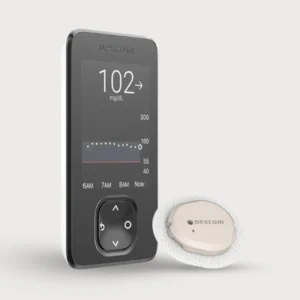Table of content
Diabetes and cardiovascular diseases are chronic conditions that significantly impact global health. Both fall under the category of metabolic disorders, which involve disruptions in the body’s normal metabolic processes. Diabetes is characterized by decreased insulin production or utilization, leading to higher blood glucose levels. Cardiovascular diseases involve a range of heart and blood vessel disorders, including coronary artery disease, heart failure, and arrhythmias (irregular heartbeat). Diabetes influences heart rate and thus is definitely linked to short term and long-term cardiovascular issues.
Diabetes and Heart Rate Connection
Research indicates a notable connection between diabetes and heart rate. Individuals with diabetes often exhibit a higher resting heart rate compared to those without the condition. This elevated heart rate is associated with increased cardiovascular risk and may contribute to the development and progression of heart diseases. Additionally, a high resting heart rate has been linked to the development and worsening of diabetes itself.
What is Diabetes?
Diabetes is a chronic metabolic disorder characterized by elevated levels of blood glucose (sugar). It occurs when the body either does not produce enough insulin (a hormone that regulates blood sugar) or cannot effectively use the insulin it produces. The two primary types are:
- Type 1 Diabetes: An autoimmune condition where the body’s immune system attacks insulin-producing cells in the pancreas.
- Type 2 Diabetes: A condition where the body becomes resistant to insulin or doesn’t produce sufficient insulin, often associated with lifestyle factors.
Heart Health
Heart health refers to the overall condition and functioning of the heart and blood vessels. Maintaining heart health is crucial, as cardiovascular diseases are leading causes of morbidity and mortality worldwide. Factors such as high blood pressure, high cholesterol, smoking, obesity, and diabetes can adversely affect heart health. If you have experienced some palpitations or are at risk of developing heart disease, then aim to decrease sodium intake to manage blood pressure, which is crucial for heart health.
Diabetes and Heart Rate:
The relationship between diabetes and heart rate is complex. Elevated blood glucose levels can lead to autonomic neuropathy, a condition affecting the autonomic nervous system, which controls heart rate. This neuropathy can result in a higher resting heart rate and reduced heart rate variability, both of which are risk factors for cardiovascular complications. Moreover, a persistently high resting heart rate in individuals with diabetes has been linked to an increased risk of developing heart diseases.
Can Type 2 Diabetes Be Reversed?
Type 2 diabetes can be managed effectively, and in some cases, individuals achieve better glucose levels through significant lifestyle changes. Key strategies include:
- Weight Loss: Shedding excess weight can improve insulin sensitivity.
- Healthy Eating: Adopting a balanced diet rich in nutrients.
- Regular Physical Activity: Engaging in consistent exercise to enhance insulin effectiveness.
- Medication: When prescribed, adhering to medication regimens to control blood sugar levels.
It’s important to note that while some individuals may achieve controlled blood sugar levels, ongoing management and lifestyle maintenance are essential to keep up with the health benefits.
Here are some of the diets that may help you in maintaining better glucose levels;
1. Mediterranean Diet
The Mediterranean diet emphasizes the consumption of fruits, vegetables, whole grains, legumes, nuts, and healthy fats, particularly olive oil. It includes moderate intake of fish and poultry and limits red meat and processed foods. This diet has been associated with improved blood sugar control and reduced cardiovascular risk.
2. DASH Diet (Dietary Approaches to Stop Hypertension)
The DASH diet focuses on reducing sodium intake and increasing the consumption of nutrient-rich foods such as fruits, vegetables, whole grains, lean proteins, and low-fat dairy products. It has been shown to lower blood pressure and improve heart health, which is beneficial for individuals with diabetes.
3. Low-Carbohydrate Diet
A low-carbohydrate diet restricts the intake of foods high in carbohydrates, such as bread, pasta, and sugary snacks, and emphasizes proteins, healthy fats, and non-starchy vegetables. This approach can aid in weight loss, stabilize blood sugar levels, and improve overall wellness.
Add whole foods by adding a variety of vegetables, fruits, very limited whole grains, lean proteins, and healthy fats into your meals. Reduce the intake of packaged and processed foods that are high in saturated fats, sodium, and added sugars. Limit saturated and trans fats (usually found in processed foods) and enjoy Healthy Fats (unsaturated fats), such as olive oil, avocados, and nuts.
Can Diabetes and Heart Issues Be Treated Together?
Yes, given their interrelated nature, it’s possible to manage diabetes and heart issues together. An integrated approach includes:
Role of Diet: Consuming a heart-healthy diet that controls blood sugar levels is vital. Emphasize whole grains, lean proteins, healthy fats, and plenty of fruits and vegetables. Limit intake of processed foods, sugars, and saturated fats.
Monitoring of Diabetes: Regular monitoring of blood glucose levels helps in making informed decisions about diet and medications, thereby reducing the risk of heart complications. Many individuals find Continuous Glucose Monitors, commonly known as CGMs, easy to monitor their glucose levels 24/7 without fingerpricks.
Importance of Diet: A balanced diet plays a crucial role in managing both conditions. Proven diet plans include the Mediterranean diet and the DASH (Dietary Approaches to Stop Hypertension) diet, both of which focus on nutrient-rich foods that support heart health and blood sugar control.
Importance of Exercise: Regular physical activity improves cardiovascular health and aids in blood sugar regulation. While the optimal timing can vary among individuals, consistency is key. Engaging in moderate-intensity exercise, such as brisk walking, for at least 150 minutes per week is generally recommended.
Sleep’s Role: Adequate sleep is essential for overall health. Poor sleep can negatively affect blood sugar levels and increase cardiovascular risk. Establishing healthy sleep habits contributes to better management of both diabetes and heart conditions.
Conclusion:
Diabetes is a chronic health condition caused by either insufficient insulin production or insulin resistance. If not managed properly, it can lead to serious complications, including cardiovascular diseases. Diet and exercise are crucial in managing or even reversing type 2 diabetes, especially when addressed early. Limiting carbohydrate intake and engaging in daily exercise, such as a 30-minute walk, can significantly improve health outcomes.
References:
https://www.nature.com/articles/s41440-023-01251-9
https://nypost.com/2025/01/03/health/best-diets-for-2025-revealed-in-new-report-one-clear-winner/
https://en.wikipedia.org/wiki/DASH_diet
https://www.verywellhealth.com/low-carbohydrate-diet-8760167
Disclaimer: This blog is only for informational purposes, before making significant dietary changes, it’s advisable to consult with a registered dietitian or healthcare provider to tailor a plan that meets your individual health needs and preferences.














Write a comment
Your email address will not be published. All fields are required